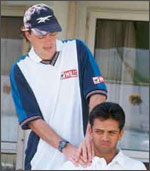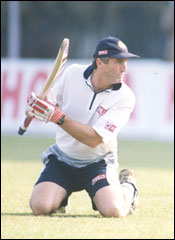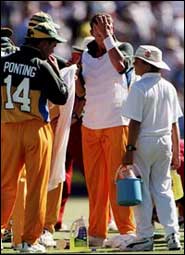The Rediff interview / Andrew Leipus
'I respect them but I am not in awe of them'
Faisal Shariff in Madras
One way to look at the BCCI is that it operates on various levels. At the
highest levels, the Muthiahs and the Leles have their own way of doing
things. At the next level, you have the executive secretaries and others,
scrambling to explain the doings of the top hierarchy. And one level below that, you have a host of officials, affiliated to the board and to the various state associations, who sizzle with anger and resentment at the
various deeds -- and misdeeds -- of the top officials.
It is from this subcutaneous level that we journalists get most of our
information from. And it is from this level that we have been hearing, for
quite a while now, of a concern area. To wit, that team physio Andrew Leipus
has not been paid since last April.
 As we understood it, there was no real reason for the payment not to be
made. When he was hired, the BCCI knew what the remuneration would be. It
has the money -- in fact, it has enough to hire a thousand Andrews and not
feel the pinch -- in its coffers.
As we understood it, there was no real reason for the payment not to be
made. When he was hired, the BCCI knew what the remuneration would be. It
has the money -- in fact, it has enough to hire a thousand Andrews and not
feel the pinch -- in its coffers.
So why was the payment not been made? This is where the 'difficult to
understand, difficult to explain' bit comes in. To even begin to understand,
you have to look at the mentality of the board functionaries. Their only
source of power over the cricketers comes from money -- and therefore, they
use that weapon to make the players, and others, grovel. And when they
grovel, the functionaries feel important.
It is, if you cut to the chase, as simple as that.
Anil Kumble needs an operation? Fine, the board will make a proclamation of
how it will foot the bills, and get the resulting media mileage. But when a
Kumble actually presents his bills for payment, he will get the runaround.
A more immediate instance in point is Andrew Leipus -- who, for close to a
year, did not get a penny of his dues. No reason, really, just the Leles of
this world behaving in the only way they know how.
It is for this reason that I was dead keen to talk to the Indian physio --
to find out what exactly was happening behind the scenes. I should have
known better -- Leipus is your quintessential nice guy. Unwilling to get
into a slanging match, uninclined to controversy.
"No, there is nothing to the payment thing, I have been paid," he says, when
I put the question to him.
I know he has -- a board official indicated that he was finally given his
dues a few weeks ago. But when I ask Leipus, he just smiles, says, "There is
no issue," and changes the subject.
Ask him, though, about his pet subject -- physiotheraphy -- and you can't
stop him talking.
"I would say that there are signs that the team is moving forward," he says.
"The players had three months off recently and they had been given a
schedule to follow, they've done that pretty well, so now there is a
noticeable improvement in their fitness levels."
He is, however, insistent that fitness is only one part of the story --
Leipus believes that this team could do with a sports psychologist as well.
And of course, there is that other big factor -- ability. "Fitness isnít
everything," he warns.
"If you donít have skill, then
you canít play cricket at this level. If the skill levels of team A and B
are the same, and if team A is fitter than team B, then obviously team A has
an advantage. The thing is, fitness and skill are foundations -- and you
cannot build a good team if your foundations are weak."
'Skill' is not part of Leipus's brief, but the fitness buck stops with him --
and he's been taking his responsibility pretty seriously.
"My first job was
to chalk out various programmes. There was one for quick bowlers, one for
batsmen, and so on. Then I sat with each individual player, and tailored the
programme to his particular needs. In that sense, each player was given an
individually tailored programme to follow."
What really makes the difference, though, is that this time, the think-tank
has factored in the chronic laziness that is part of our mental makeup, when
building these regimens. Given a choice, the Indian cricketer will skip his
workout, or at the least, avoid the hard bits. To counter that, Leipus has
worked out his own system.
Thus, as the first step, the players were given fitness regimens to follow
during the off season -- but they were also told that when they got together
again, they would be tested. The warning was reiterated during the Zimbabwe
series.
When the players got together in Madras, Leipus immediately put them to the
test -- and some of them failed. Fines of Rs 40,000 were handed out to the
defaulters -- and they have been informed that they will be tested again on
the last day of the camp, and a further failure will result in even bigger
fines, and other penalties.
The idea, says Leipus, is to get the players accustomed to the idea that
off-season or on, they have to be fit all the time. "It is up to them to
maintain that basic level of fitness -- then I can build on that during
these camps," Leipus explains.
As far as the Madras camp goes, Leipus has the first 40 minutes to himself.
 "John [Wright] has given me that time, each morning, for warm-ups. The difference is
that now, the warm-ups are more intense. You see, it is not possible to
improve fitness during a camp like this -- that is why I have them doing it
during the off season. These camps are meant to fine-tune things, to push
them to a higher level, I work on pushing them out of their comfort zones,"
he explains.
"John [Wright] has given me that time, each morning, for warm-ups. The difference is
that now, the warm-ups are more intense. You see, it is not possible to
improve fitness during a camp like this -- that is why I have them doing it
during the off season. These camps are meant to fine-tune things, to push
them to a higher level, I work on pushing them out of their comfort zones,"
he explains.
Leipus is a hard taskmaster but, it turns out, not an unreasonable one. "One
problem," he says, "is that our guys play too many domestic games, sometimes
back to back, and when that happens it is difficult to keep the motivation
levels going.
"Say for instance they play a four-day game. There could be
conceivably one day when they do nothing -- so I get them, on that day, to
have a tough session, and then sample their sessions, analyse their body
response. You can't have rigid timetables, you have to work around the
existing situation, but still make sure the players are at peak fitness."
So which of the Indians enjoys training? Leipus cites VVS Laxman and Rahul
Dravid among the seniors, Kaif, Badani, Sriram and Das among the juniors, as
the keenest of the bunch.
Harking back to the original premise, I point out that the Aussies, Proteas
and Kiwis play quite a lot of cricket, how come they find time to train to
such high levels of fitness?
"I think you have to take cultural differences into account as well," Leipus
argues. "Guys in
those countries like to train, and train hard. Indians on the other hand are
intrinsically resistant to training. They don't get all excited about
working out, whereas the guys in Australia and South Africa get a big kick
out of it. I don't play any sport, for example, but I love to train, I train
very hard and I have great fun doing it, that is because it is part of my
mental make-up as an Aussie. So for a physio, it is easier to work with
Aussies and South Africans and their like, because they have an interest in
what you are doing with them.
"Indians, on the other hand, only get excited
about putting bat to ball. So my challenge is to get our guys to actually
enjoy the whole experience, only then can I get down to actually training
them."
Indians, I also suggest, tend to have egos, tend to play prima donna -- is
that a problem he faces?
Leipus being Leipus, he skips the question of whether our guys are in fact
prone to putting on airs, and responds tangentially. "It is easier for me, I
guess, to handle them because I am a foreigner. I respect them for their
talent yes, but I am not in awe of them, as say an Indian coach or physio
would be. If someone is not pulling his finger out, I'll tell him so, and I
will say it as harshly as I need to. That is one good thing I learnt from
John, as a matter of fact -- to stand no nonsense."
And that brings us to his interactions with India's new coach -- how has the
experience been?
"When he arrived, he told me he was glad I was working with the boys. John
has been very supportive -- I am not saying the earlier coaches weren't, but
you know straight up that John means business. If you don't show interest,
believe me, he will ask you to pack your bags and fly away, and he doesn't
give a hoot who it is he is talking to. He might on the surface seem a
softy, but beneath, he is tough, he has a temper, he can get very angry. He
has tremendous man-management skills, a real way with people. We share a great
working relationship," Leipus, obviously hugely enjoying working with a
no-nonsense coach, eulogises.
"When he first got here, we talked a lot, I gave him info on how things work
in this part of the world, I wrote it all out for him, we then discussed
what we had to do. We spoke about the need to cultivate a
fitness-conditioning attitude in the boys.
"Thanks to that interaction, it is much easier and nicer now. I don't take
part in fielding practise, for instance -- earlier, under other coaches, I
found myself doing that a lot, and I don't think that was fair to me. Darn
it, I am not a cricketer, I don't have a down-deep grasp of what is required
when fielding, so asking me to handle the fielding practise was not the
right way to go, since I wasn't equipped to do a good job. Under John, all
that has changed -- he has streamlined the way things function. Now, he
takes care of all cricketing matters, I take care of fitness and injuries,
which is what I am technically equipped to do, and it works just fine."
What Leipus said, about being asked to handle fielding practise in the past,
cuts to the root of the problem -- we as a rule are not only not
fitness-oriented, we do not for the most part have an understanding of what
a physio is all about.
"True," says Leipus. "When I first got the job, I was appointed as the
physiotherapist. You need to understand that a physio is NOT a trainer. He
does not take care of conditioning or training, he merely deals with injury
management. I also have a degree in sports science, a good grasp of Kinesiology, which is the study of
body movement, biomechanics and sports psychology. So I did what a
physiotherapist would not have done, what he is not expected to do. I
studied the techniques of this sport, and the biological demands on the
players, then broke it down to learn the constituents, and to devise an
appropriate fitness regimen which suits the sport."
Another subject that Andrew Leipus holds dear is the value, in sport today,
of a qualified sports psychologist -- in fact, he is emphatic that the team
needs one.
"Most definitely we do," he avers. "Take the examples of tennis or
golf -- the top 100 players are more or less at the same skill levels. So
what seperates the champions from the rest? The answer is simple -- the
mind.
"Those who can mentally image what they will do, those
with intrinsic motivation and the psychological skills, will win, those who
are clear with their goal-setting will succeed.
"This is what separates the great from the merely good -- the skills might
be the same, but the great player has the ability to have a clear picture in
his mind of what he will do with his skills, he can concentrate on that
picture for long periods and he can make it come true, and to do that, he
will work hard -- and even harder when the going gets tough.
"You can't overemphasise the importance of developing a strong, focussed
mind, actually. I mean, look at it from the point of a batsman. As the ball
is delivered, you have to analyse the position of the bowler, his grip, the
height from which the arm is coming down, any changes in angle the bowler is
trying, the position of the seam, the follow through, the atmospherics and
how it will affect what the ball does -- and you have a split second to do
it all in. You better learn to develop a strong, focussed mind, mate!"
Actually, the Indians have made a start of sorts with Ganesh, the visiting
psychologist attached to the camp. Leipus, however, is non-committal.
"I donít know how well that is working, you need to ask the players," he
says.
"I feel though that a psychologist should be with the
team on a full-time basis when they are playing, and available to them at
any time during the off-season as well. How you perform is based as much on
social issues as on cricketing ones -- you obviously won't be at your best
if, say, you are going through a traumatic divorce, to cite an extreme
example. This is where a psychologist comes in handy -- he can talk the
player through a slump in form, he can equally help him sort out personal
issues that are preying on his mind and distracting him from the cricket. If
we can find the right man for the job, then I think we should have a full-time sports psychologist."
The Aussies, meanwhile, appear to be preparing for the Indian tour with a
vengeance, and with some unusual aids -- the ice vests, for instance. Is
that a good idea, to wear ice next to your skin in the sweltering heat of
India?
 "No, it is not unhealthy," Leipus is unequivocal. "This is another great
Indian myth. Why should cooling off be unhealthy? I have myself asked for ice wraps
for the necks. There is a gel in it, which freezes and stays cool. Did you know that if the body temperature increases by one or two degrees, the performance level drops considerably? Ice wraps are very helpful. They will help the Aussies a lot -- in fact, even we should have them.
"No, it is not unhealthy," Leipus is unequivocal. "This is another great
Indian myth. Why should cooling off be unhealthy? I have myself asked for ice wraps
for the necks. There is a gel in it, which freezes and stays cool. Did you know that if the body temperature increases by one or two degrees, the performance level drops considerably? Ice wraps are very helpful. They will help the Aussies a lot -- in fact, even we should have them.
"Cooling the body temperature always helps. There are situations when the cooling should be slowly done -- but that is only for people who have blood pressure problems. What happens is that the blood in your skin perforates with the heat and if it suddenly cools, it
overloads the heart with the gush of blood. But for an athlete at the peak
of fitness? It is a blessing, really," Leipus believes.
We would -- he would -- have talked further, for the subject of fitness is
very close to his heart. But the demands of the camp summon him, and off he
races, to tweak yet another muscle, to inch the fitness level up another
notch.
Related interviews:
'I think that in the next 12 months this team will be a much better and fitter lot'
Interviews
Mail Cricket Editor